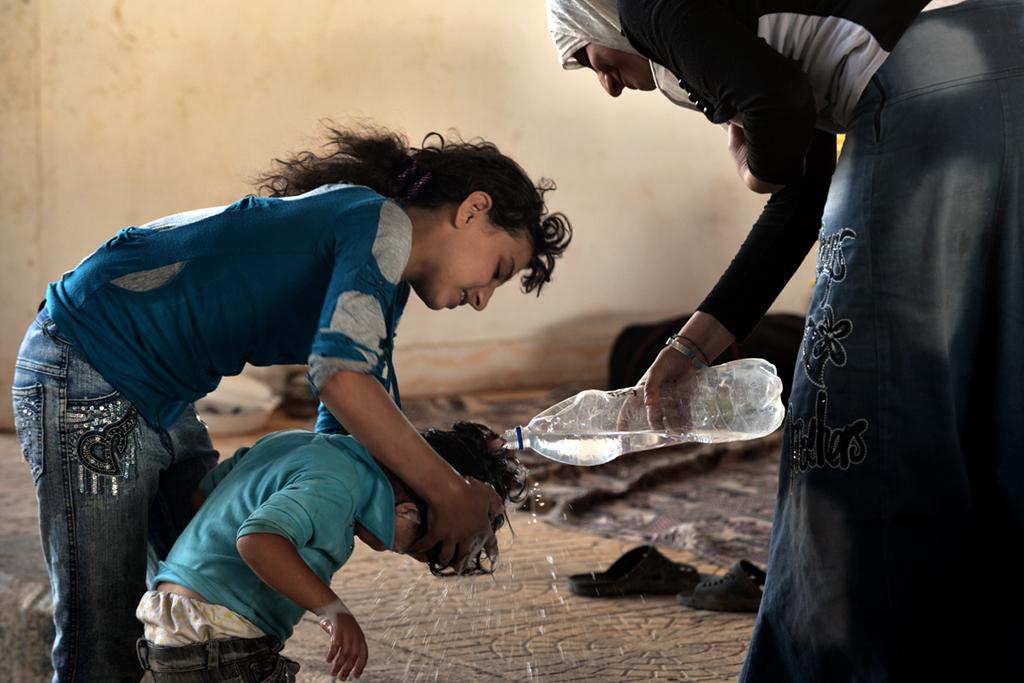On Mother’s Day, remembering the real leaders in the search for security
A Syrian mother takes care of her children after they were displaced from their houses due to fighting between rebel fighters and Syrian government forces on Aug. 25, 2012 at the Syrian border with Turkey.
WASHINGTON — This Mother’s Day, when our nation reflects on the contributions mothers make to our lives, it’s time to look beyond our borders and accept a simple truth: Mothers everywhere help make the world a safer, more stable place to live.
As the leader of an international development company, I have experienced firsthand the power of women to address the root causes of insecurity and promote governance and economic development. But I have also observed that, especially in the developing world, women too often are viewed as victims and mere consumers of security services, rather than as important security actors in their own right.
Yes, women are at risk as targets of domestic or gender-based violence. But to see Syrian women in the midst of a civil war serving as couriers for the opposition, or grandmothers in Honduras helping young gang members reintegrate into their communities, leaves no doubt that women are central to providing security for themselves and their communities.
Consider two examples that illustrate how women, serving as informal security actors, have helped make a difference in long-term stability in challenging environments.
In Jordan, the work we do with mothers and children to prepare them for school is as much about preventing violent behavior as it is about learning the ABCs. It begins with giving mothers preschool education packets to teach their sons how to resolve disputes with words, not fists. In a country with one of the worse records of school violence, records show that boys who participate in our USAID-supported program are less likely to fight and more likely to learn than those who do not.
Similarly, we worked with the mothers of former gang members in Central America to reintegrate them into their communities with the help of job training that returned them from the abyss of crime and violence. These mothers also became important interlocutors among their communities and local mayors, police and other government leaders.
Thanks to the work of leaders such as former Secretary of State Hillary Clinton and her colleagues at the United Nations, including former Chilean President Michele Bachelet, women’s rights have become a core value in US foreign policy and international diplomacy.
Passage in 2000 of UN Security Council Resolution 1325 — which affirmed the vital role of women in the preventing and resolving conflicts and in post-conflict reconstruction — underscored that without women working in peace-building and peacekeeping, there would be no peace.
This concept was memorialized in our own National Action Plan on Women, Peace, and Security, approved by President Obama in 2011, which made the perspective of women and girls part of the DNA of US foreign policy. Secretary of State John Kerry made continuation of the Global Office on Women one of his first actions in office, ensuring that gender-based programming will have a central role in our foreign policy agenda.
When it comes to successfully spending US resources, our engagement with women gets us the greatest return on our investment. Whether helping mothers educate their preschoolers, or giving women income-generating job training, or showing women how to prevent their sons from getting a toehold in gangs, our investment in women leads to significant payoffs, for them personally and for their societies.
Government must embrace these lessons from the private sector, yet the private sector experience is rarely incorporated into US security assistance programs. Nor do we have a mechanism for ensuring that our best practices are actually reviewed by the government and applied around the world.
But if we accept that mothers are an essential tool for preventing violence, I would like to recommend four steps to integrate this concept into our foreign policy planning:
First, we need to bring private sector companies with robust operational experience abroad into a formal partnership with government agencies and civil society organizations.
Second, the private sector should be included in a national dialogue on how to implement the National Action Plan on Women, Peace, and Security, so that the lessons learned on the ground overseas become part of our strategy and planning process in the future.
Third, this government, civil society and private sector partnership must create metrics that effectively evaluate the impact of our programs for community security on women, focusing on their roles in improving stability, governance and sustainable development.
Finally, the United States should review our security assistance programs through a gender-sensitive lens, to ensure that necessary linkages are made between security, justice, governance, education and development policies.
On this Mother’s Day, let us remember who the real leaders are in our search for a more peaceful and stable world. Our unsung mothers, sisters, daughters and grandmothers labor tirelessly as our most important security actors.
M. Charito Kruvant is president and CEO of Creative Associates International, Inc., and, more importantly, a mom and grandma.
Our coverage reaches millions each week, but only a small fraction of listeners contribute to sustain our program. We still need 224 more people to donate $100 or $10/monthly to unlock our $67,000 match. Will you help us get there today?
